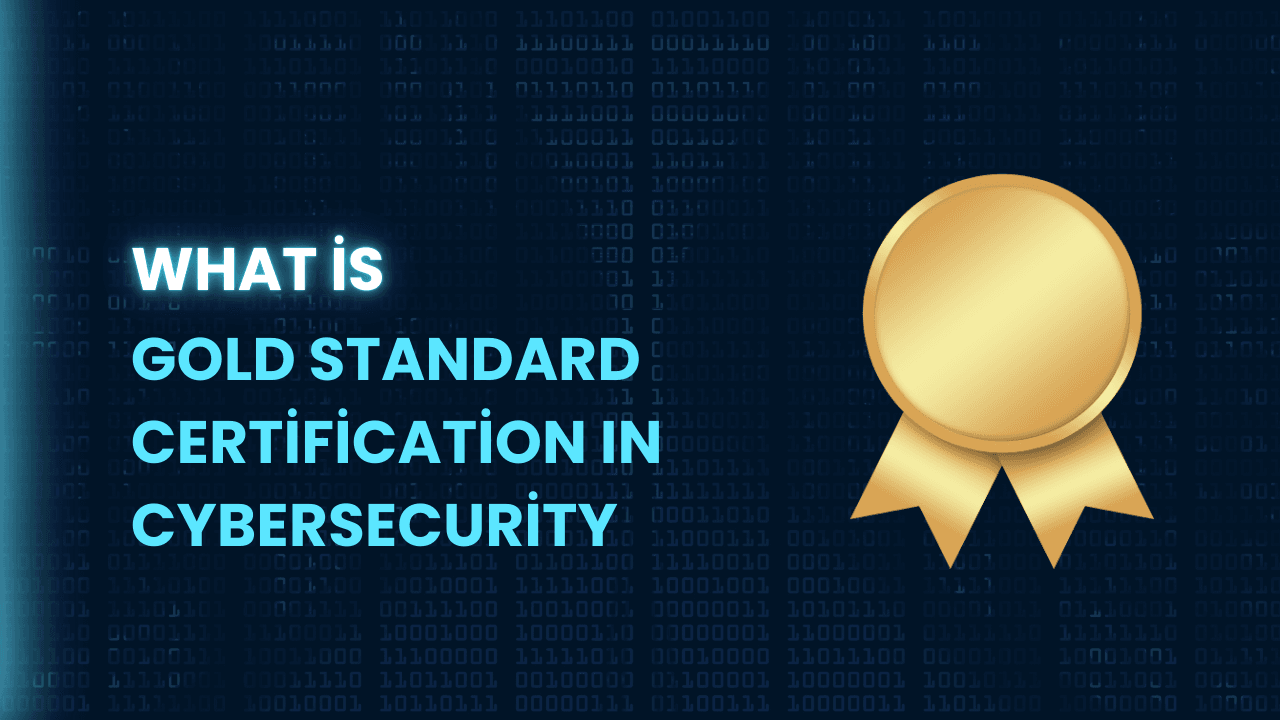
What sets apart the best cybersecurity professionals from the rest? It’s often their credentials; only some certifications carry as much weight as the Gold Standard Certification in Cyber Security.
This elite qualification signals mastery in defending against cyber threats, managing risk, and ensuring data protection.
In this article, we will discuss what the Gold Standard Certification entails, why it’s highly regarded in the industry, and how it helps professionals stand out in a rapidly growing field of digital security.
What is Gold Standard Certification in Cyber Security?
The Gold Standard Certification in Cyber Security is a prestigious credential recognizing expertise in maintaining and managing secure environments. It’s not just about theoretical knowledge but demonstrates a real-world ability to protect systems from potential breaches, malware, and cyber-attacks.
By obtaining this certification, individuals and organizations prove they have advanced skills in threat detection, data encryption, network security, and compliance with international standards.
The Gold Standard Certification is highly regarded in the industry, symbolizing that a professional or organization has met rigorous standards set by top cybersecurity bodies. It enhances trust with clients, stakeholders, and regulatory bodies.
This credential isn’t simply a stepping stone—it’s a badge of honor that speaks to an individual’s or organization’s commitment to maintaining security at the highest level.
Why is Gold Standard Certification Important?
In a world where cyber-attacks are becoming more sophisticated, a Gold Standard Certification signals clients and customers that a business is well-prepared to handle cyber threats.
The certification ensures cybersecurity professionals are familiar with the latest trends and threats and possess practical skills to prevent breaches.
With cyber-attacks happening more frequently than ever, the need for stringent security measures is paramount.
Businesses can suffer significant reputational and financial damage if they fail to protect sensitive data. Having professionals with a Gold Standard Certification on board significantly mitigates the risks.
Tangible Benefits of Gold Standard Certification
Acquiring this certification brings a multitude of benefits, including:
👍🏻 Increased Trust: Customers and partners prefer working with organizations that take cybersecurity seriously. Gold Standard Certification demonstrates your commitment to protecting valuable data.
👍🏻 Better Job Prospects: Cybersecurity experts with this certification are highly sought after, often securing top-tier positions in well-known firms.
👍🏻 Improved Knowledge: This certification ensures professionals stay updated with current and emerging threats, helping them stay on top of industry changes.
👍🏻 Regulatory Compliance: Having Gold Standard Certification helps meet strict regulatory requirements, especially when dealing with financial institutions and government agencies.
What Does Gold Standard Certification Cover?
The certification process is comprehensive and covers several key areas of cybersecurity:
- Threat Detection and Mitigation: This section covers recognizing and stopping potential threats before they can cause harm. Professionals are trained to identify software, hardware, and network infrastructure vulnerabilities and resolve them effectively.
- Network Security: Ensuring that all communication within an organization is secure, Gold Standard Certification covers methods like firewalls, encryption, and VPNs. Professionals need to know how to implement secure data transfer and communications channels.
- Data Encryption: Protecting sensitive information is vital. The certification emphasizes encryption techniques that ensure that even if data is intercepted, it remains unreadable to unauthorized individuals.
- Compliance and Legal Standards: This part ensures that professionals are well-versed with international laws and regulations regarding data protection, such as GDPR and HIPAA.
How Do You Obtain the Gold Standard Certification?
Becoming certified is a complex process, and it shouldn’t be. The Gold Standard Certification aims to ensure only the most skilled and knowledgeable professionals receive it. The process includes:
✅ Training Programs: These programs are often intensive and cover every aspect of cybersecurity. Training can be done through reputable organizations that specialize in cybersecurity certifications.
✅ Examinations: After training, an exam tests the knowledge and skills of the professional. The exam typically includes multiple-choice questions and practical, real-world scenarios that must be solved.
✅ Ongoing Education: The field of cybersecurity is constantly changing. Professionals with Gold Standard Certification are often required to continue their education and renew their certification every few years.
Secondary Certifications that Complement Gold Standard Certification
While Gold Standard Certification is highly regarded, pairing it with other certifications can further demonstrate expertise. Some complementary certifications include:
- Certified Information Systems Security Professional (CISSP): A globally recognized certification that proves an individual has what it takes to design, implement, and manage a cybersecurity program.
- Certified Ethical Hacker (CEH): This certification focuses on finding system vulnerabilities by thinking like a hacker. It’s an essential tool for those looking to strengthen their cybersecurity toolkit.
- CompTIA Security+: While less advanced than the Gold Standard Certification, this entry-level certification provides a solid foundation in cybersecurity principles.
Gold Standard Certification in a Corporate Setting
Many corporations now look specifically for Gold Standard Certification when hiring cybersecurity experts or consulting firms. They understand that this certification ensures an extra layer of safety for their operations. Industries such as banking, healthcare, and government organizations, which handle large amounts of sensitive data, often require this level of certification for their cybersecurity teams.
Moreover, businesses benefit by showing that they take cybersecurity seriously, reducing the risk of cyber-attacks and keeping valuable information safe from intruders. With companies facing heightened scrutiny for how they protect consumer data, the Gold Standard Certification can provide a competitive advantage in winning new clients.
Is Gold Standard Certification Worth It?
For those serious about advancing in cybersecurity, the answer is yes. The time, effort, and resources required to earn this certification are well worth it, as it opens doors to new career opportunities and provides businesses with the assurance they need to trust their cybersecurity practices.
Whether you’re a seasoned professional or new to the field, obtaining a Gold Standard Certification in cybersecurity signifies that you are dedicated to maintaining the highest standards of safety and protection in a constantly changing digital landscape.
Conclusion
In an age where cyber-attacks are more frequent and dangerous, the Gold Standard Certification is a hallmark of expertise and commitment to safety in cybersecurity.
It ensures that professionals and organizations are well-prepared to face the latest threats and protect sensitive data. Investing in this certification is not just about protecting systems—it’s about demonstrating trust, reliability, and a forward-thinking approach to digital security. Whether you are a business looking to secure your systems or a professional wanting to advance your career, Gold Standard Certification is a worthy investment.






